3. Central Asia and Caucasus
Central Asia and Caucasus are politically and geographically important areas, since they are surrounded by Russia, China, South Asia, the Middle East, and Europe. With their large abundance of energy and mineral resources such as oil, natural gas, uranium, and rare metals, the regions are also strategically important to Japan, which has been promoting resource and energy diplomacy aiming to diversify resource supply countries. For this reason, the stability and development of these regions are crucial for the stability and development of the Eurasian region as a whole, including Japan. From this perspective, Japan has provided support for nation-building conductive to the long-term stability and sustainable development in these regions, with a view to making universal values take root, including human rights, democracy, market economy, and the rule of law, while taking into consideration a broader regional perspective which covers Afghanistan, Pakistan, and other regions bordering Central Asia.
< Japan's Efforts >
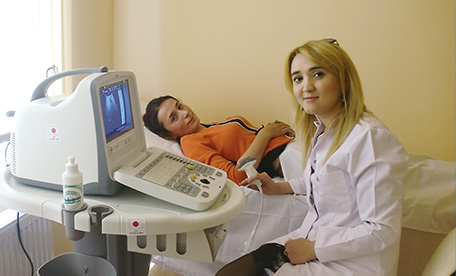
A pregnant woman having an ultrasonographic check up at the medical point in Gandakh village of Zagatala region in Azerbaijan, which is newly built and well equipped with medical facilities. (Photo: Fumie Sugiyama / Embassy of Japan in Azerbaijan)
In order to facilitate the transition from planned economies to market economies as well as economic development, Japan has conducted a diverse range of assistance activities in such areas as the improvement of legal systems, the rebuilding of health and medical care, and other social systems, the improvement of infrastructure for economic development, and human resources development for the transition to a market economy. For example, Japan Centers* in Uzbekistan and the Kyrgyz Republic have contributed to human resources development that can respond to the transition to market economies by providing business courses and other activities based on Japan's experiences.
Some of the largest oil fields in the world have been found in the Caspian Sea coast of Kazakhstan and Azerbaijan where Japanese companies also have interests. The stability and economic development of the region are important for stabilizing the international energy market as well as for securing the energy resources of the international community. Japan has provided assistance to the region, including support for the improvement of public services, human resources, and infrastructure like power plants.
Japan also established the framework of the “Central Asia plus Japan” Dialogue in 2004 to promote regional cooperation in Central Asia. It has conducted dialogues and facilitated cooperation at a variety of levels, including foreign ministers' meetings and senior officials' meetings. In July 2014, the tenth year of the Dialogue, the fifth foreign ministers' meeting was held in the Kyrgyz Republic.
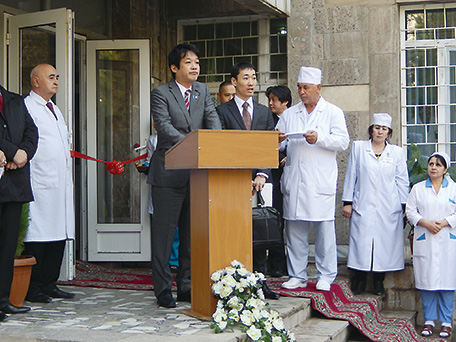
Parliamentary Vice-Minister for Foreign Affairs Kentaro Sonoura addressing a speech at the presentation ceremony of medical equipment for a gastrointestinal hospital in Dushanbe City in Tajikistan in November 2014.
- *The Japan Center
- There are ten Japan Centers in nine countries, which aim to develop human resources to support the transition to market-oriented economies in countries with transition economies in Central Asia and the Indochina region. Japan Centers serve as a venue to facilitate personal contacts between Japan and these countries, and provide a fine example of the visibility of Japanese aid. At present eight centers in seven countries are ongoing as JICA projects (two centers for which JICA projects are completed are also continuing their operations). Their main activities include the provision of business courses and Japanese language courses, and the promotion of mutual understanding.
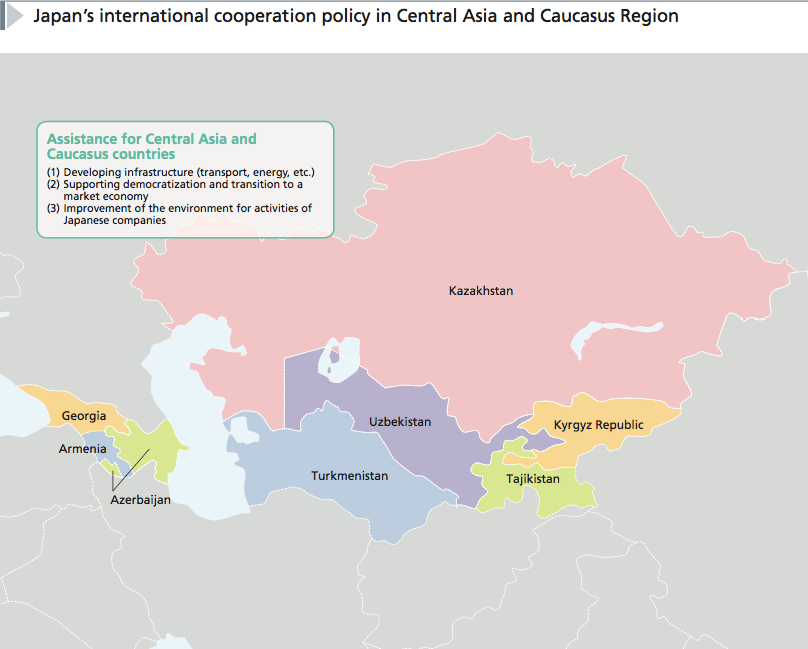
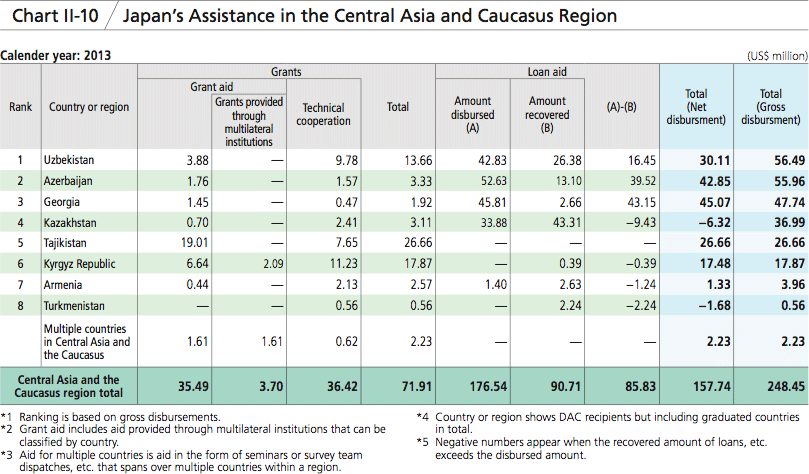
| Kyrgyz Republic
The Project for Promotion of Exportable Vegetable Seed Production
Technical Cooperation Project (May 2013 – Ongoing)
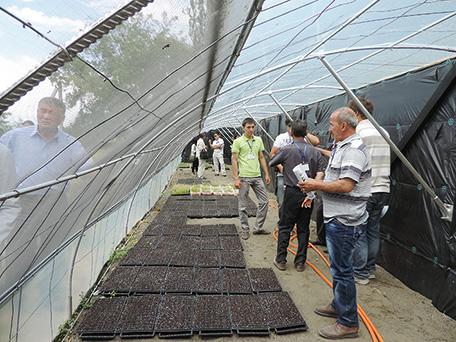
A seedling production facility where seedlings are raised in trays. (Photo: JICA Kyrgyz Republic Office)
Agriculture accounts for 22% of the GDP of the Kyrgyz Republic and is one of the main pillars that support the country's industries. Approximately 30% of the country's population is engaged in agriculture. During the former Soviet Union era, the Kyrgyz Republic was a major production area for seeds, including grains and vegetables, thanks to its dry climate, abundant water resources, and vast irrigation land. However, following the collapse of the Soviet Union, production technologies were not updated, and no mechanisms were established to promote such technologies. This situation persisted, causing seed production to decline significantly. In addition, the Kyrgyz Republic lacks schemes to promote the production of vegetable seeds that is undertaken primarily by the private sector. The Kyrgyz Republic has no producers with the production technologies needed to conduct business with foreign companies.
Japan started a technical cooperation project with the aim of improving this situation, increasing the country's capacity to produce high quality seeds at reasonable prices, and turning vegetable seed production into a successful export business in the Kyrgyz Republic. The main activities of the project include the pilot cultivation of seeds at training farms, the formulation of manuals, and the implementation of trainings for farmers engaged in seed production.
A variety of inspections is conducted during the process of seed production. With the post-project phase in mind, this project promotes the improvement of inspection techniques to ensure that the Kyrgyz Republic can conduct inspections based on its level of technology and resources. Furthermore, in addition to the provision of training to enhance the business management abilities of vegetable seed producers, this project provides support that creates opportunities to come into contact with overseas nursery companies in order to help boost seed production as an export business.
This project is anticipated to contribute to enhancing the skills of seed production farmers and increasing the production of high quality seeds, as well as increasing the export of seeds through tie-ups between seed production farmers and overseas companies. In addition, the project is expected to meet the seed production needs of neighboring countries, including Russia.
(As of August 2014)
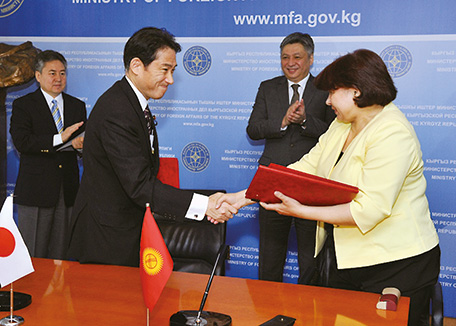
Minister for Foreign Affairs Fumio Kishida and Ms. Olga Lavrova, Minister of Finance of the Kyrgyz Republic signing the Exchange of Notes regarding grant aid projects in Bishkek, the capital city of Kyrgyz Republic in July 2014 (the person clapping hands at the back is Mr. Erlan Abdyldaev, Minister of Foreign Affairs of the Kyrgyz Republic.)
